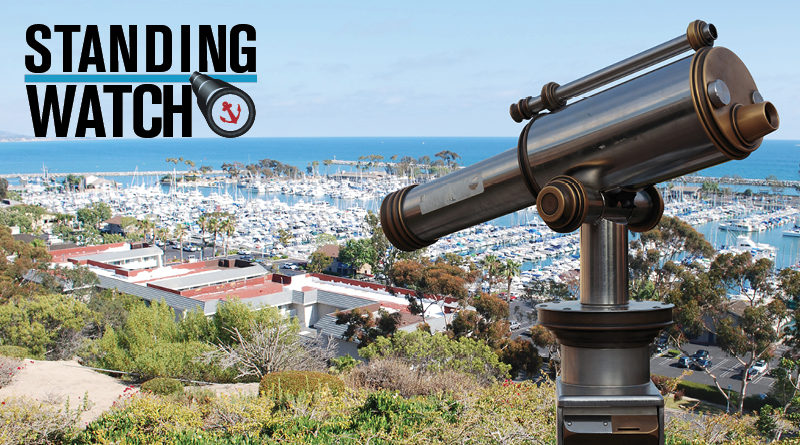Earn green to keep your marina green
Free money is available from BoatUS (among others) to help local groups implement clean (and safe) boating practices.
NATIONWIDE—Boaters and anglers are certainly stewards of the water. Environmental issues certainly matter to anyone who owns a boat, a fishing rod or both. This writer and editor was recently at a meeting where marina managers and boat owners were trying to figure out who dumped fecal matter into one of Marina del Rey’s basins. Keeping our marinas as clean as possible – both on the docks and in the water – definitely requires attention and effort. Thankfully there is financial support out there to help boaters, marina managers and others practice clean and safe boating.
BoatUS recently sent out an email urging boaters to participate in its “Boating Safety and Clean Water Grassroots Grant” program. The grant program, which is part of the BoatUS Grassroots Grant initiative, awards up to $10,000 to local groups to help them educate boats on clean and safe boating practices.
Grant applications are accepted on a rolling basis, 365 days per year, meaning applicants can apply at any time. The application process starts with a local group submitting a letter of intent, briefly summarizing the proposed project. BoatUS will ask for a full proposal if the project proposal meets the national organization’s Grassroots Grant guidelines.
“Past projects have ranged from public service announcements on the effects of boating under the influence and installing fishing line recycling bins to hands-on education about the effects of marine debris and even a distinctive airborne blimp adorned with boating safety messages,” a BoatUS statement on the available grant funding.
BoatUS Foundation’s Director of Outreach Alanna Keating said the grants are made available to help change boater behavior.
“Our goal is facilitate behavioral changes in the boating community,” Keating said in a released statement. “We are always looking for unique ideas that reach local boaters, either through technology or in other ways that can be measured in terms of success.”
The foundation, since 1989, has awarded more than $1.3 million to organizations “that have developed creative projects to promote safe and clean boating on their local waterways.”
Visit BoatUS.org/Grants for more information on the organization’s grants and application process.
The California Clean Marina Tool Kit
The California Coastal Commission, with the Division of Boating and Waterways as a partner and National Oceanic and Atmospheric Administration (NOAA) as a funder, produced “The California Clean Marina Tool Kit,” which is positioned as a “resource for environmentally sound marina management and operation.”
It’s basically a set of guidelines for marina operators to identify and implement clean marina practices. Boaters could encourage their marina managers to do more than take a flyer on the Tool Kit (assuming your marina doesn’t already have policies in place, consistent with the spirit of the Took Kit).
The Tool Kit is broken down into four parts: recommended practices to address pollution problems; educating boaters to be partners; case studies; and, available resources. It acknowledges there is no “one-size-fits-all” approach to operating and maintaining a clean marina.
Marina managers who have the Tool Kit are provided with a set of suggested management strategies. They could develop and implement environmental policies, create a clean marina plan, provide staff training and prepare an emergency response.
There are at least nine areas where marinas can implement maintenance strategies: vessel cleaning and maintenance; boat sewage; oil and fuel; hazardous waste; trash and marine debris; gray water; fish waste; boat operation; and, stormwater and polluted runoff.
Environmental policies should be catered to the practices and habits of the marina’s boating community, the Tool Kit explains. Any adopted policy should also state the consequences of not adhering to the prescribed mandate. Signs to explain various environmental policies should be conspicuously placed in strategic places, such as fuel docks, pompous stations and the marina office, among other places.
Marina managers are also encouraged to maintain open communications with boaters, particularly when it comes to environmental policies and clean marina initiatives. Managers should, for example, provide suggestion boxes, be involved with tenant associations and ensure confidentiality whenever a slip owner reports on a violation.
Resources for financing clean marina management strategies are also included in the Tool Kit.
The Tool Kit also makes the following recommendations for those who develop a “Clean Marina Plan,” as explained in the Coastal Commission’s provided document:
- Authorize someone to be responsible for developing and implementing the Clean Marina Plan
- Conduct an on-site marina assessment
- Assess and implement environmental regulatory compliance
- Actually develop a Clean Marina Plan
- Communicate the plan to marina staff
- Foster a “clean marina attitude”
- Frequently evaluate and update the plan.
Dockwalker Program
The Division of Boating and Waterways also offers its Dockwalker Program to boaters. Dockwalker Program was established in 2000 and is primarily an education tool to inform boaters of the benefits of clean boating through word of mouth. People participating in the program distribute educational kits to boaters at boat launch ramps, marinas and boating events.
The boater kits include information on oil-related pollution, boating safety, clean boating habits, clean boating maps and the ABCs of California Boating Law.


